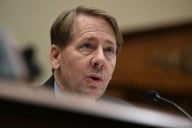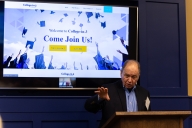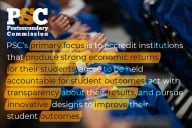You have /5 articles left.
Sign up for a free account or log in.
A prominent technology think tank wants the federal government to encourage the use of standardized assessments to measure postsecondary knowledge and skills, with an approach that would separate learning from credentialing and challenge the dominance of traditional college degrees.
In a new report, the Information Technology and Innovation Foundation called for the “radical step” of “breaking the ironclad link between education and certification.”
That ask, which would take away from colleges and their faculty members the primary role of determining student achievement, is not likely to win many fans in the professoriate. (The foundation provided an advance copy of the report but did not allow outside experts to see it and comment before the release today.)
The group also goes farther than a range of attempts by the Lumina Foundation, the U.S. Chamber of Commerce Foundation, the Measuring College Learning project and other reform-minded players to determine the right competencies or desired learning outcomes for academic disciplines or degree tracks.
Those efforts continue to put the college degree at the center -- even while in some cases encouraging alternative credentials -- by attempting to improve the explicit message a degree sends about what its holder knows and can do. And that sort of reform stops short of opening the door to a test being the four-year degree’s equivalent.
Yet the foundation said dramatic change is needed to tackle serious and worsening problems in higher education.
Those urgent challenges, according to the report, include rising college costs, worrisome signs that students are not prepared to join the workforce and four-year institutions’ hesitancy to issue transfer credit for students who attended community colleges, as well as for learning that occurs outside the traditional classroom, such through nonaccredited online courses or at coding boot camps.
“Higher education lacks many of the traits of a competitive market, including ease of entry, price transparency, information about the quality of the service being purchased and motivated customers,” the report said, arguing that the academy’s problems “stem from the inherent conflict of interest in having the entity responsible for educating students be the same one that evaluates how well they have succeeded in doing so.”
A better approach, the group said, would be for the federal government to push for the creation of a “national network of certified organizations that assess the learning and skills of young people before they enter the workforce.”
The report said the U.S. Congress could take a big step in this direction by using the renewal of the Higher Education Act, which is the law that governs federal financial aid, to establish a process to accredit organizations that provide certifications, both to ensure quality and to open up federal aid eligibility for noncollege learning.
Third-party credentialing systems currently exist for vocational jobs such as auto repair, welding and truck driving, as well as in law, medicine and other licensed professions. But the think tank said a similar process should be created for measuring competencies for the “jobs of the future, including those requiring the skills normally associated with a college diploma.”
Standardized assessments from outside groups, not colleges or other education providers, should be used to measure that learning, according to the group. And those assessments should not discriminate based on where a student achieved the necessary proficiency, whether through learning on the job, by taking MOOCs, studying on their own or by attending a four-year university or a community college.
“We want to be able to measure what people are actually learning,” said Joseph V. Kennedy, a senior fellow at the foundation and the report’s lead author.
Kennedy, who was previously the chief economist for the U.S. Department of Commerce, said he believes assessments can be created that would adequately measure undergraduate-style learning and knowledge, even in the humanities.
“Whatever you are interested in learning about someone’s abilities, I think you can devise a test to measure it,” he said.
The report includes other steps the feds could take to encourage the widespread acceptance of assessments and alternative certifications.
For example, federal agencies could change their job requirements to drop degrees and to focus on certifications. And the report said the U.S. Department of Education should allow students to use federal aid for alternative learning options, such as MOOCs (which the department is doing, albeit on a limited, experimental basis).
Likewise, the department should encourage colleges and universities to open up graduate programs to applicants with alternative certifications, perhaps even those who do not hold a formal college degree.
“Separating the tasks of education and certification will increase pressure on existing institutions to hold down costs and to provide measurable improvements in education,” the report said. “These reforms will also give students better information about the quality of the education they can expect to get and give employers better information about the readiness of job applicants.”
Even so, the shift won’t happen easily, acknowledged Kennedy.
“We’ll get there in steps, if we do at all,” he said. “But that’s the end goal.”








